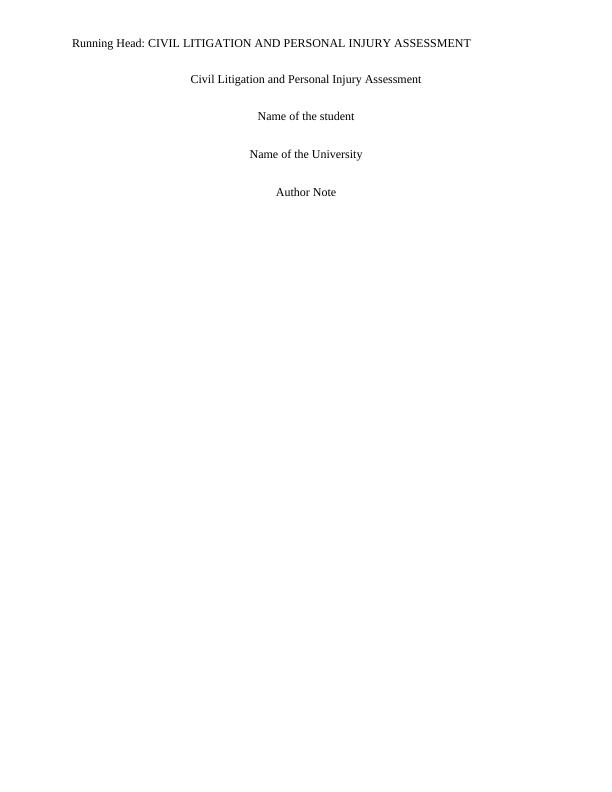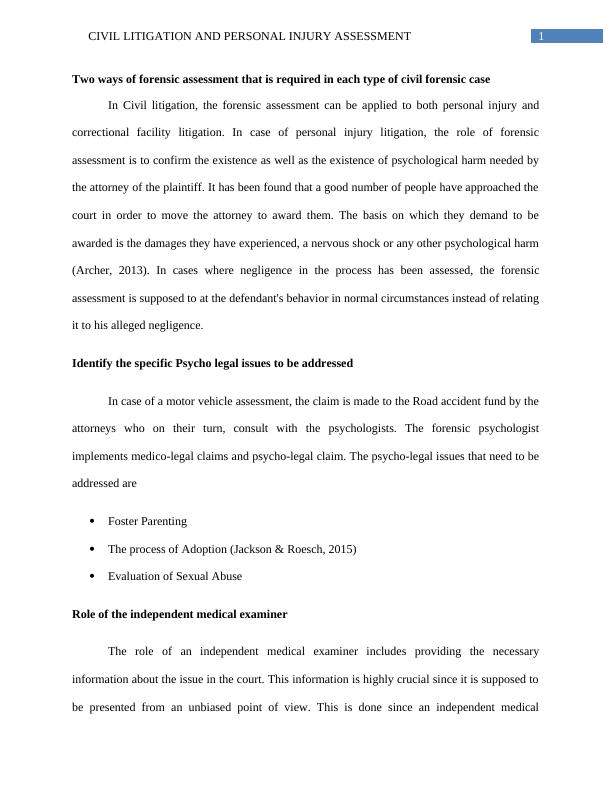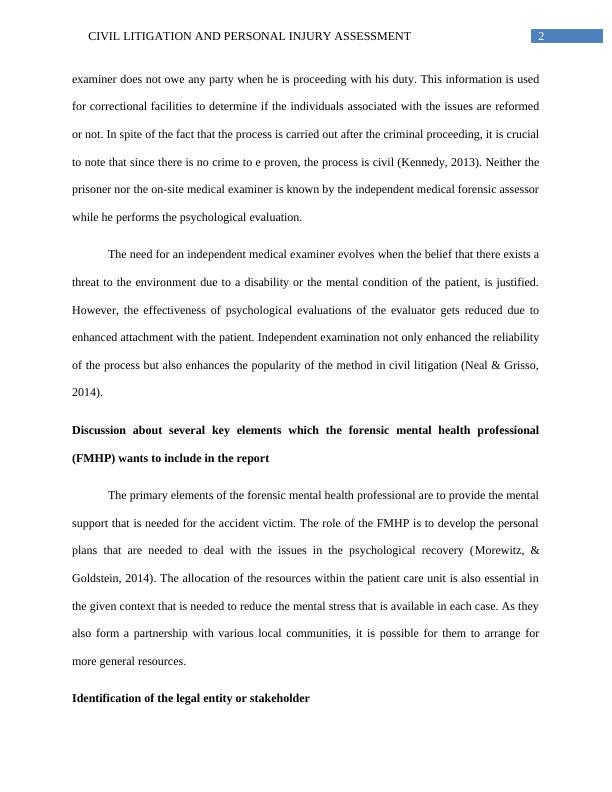Civil Litigation and Personal Injury Assessment
Added on 2023-06-15
6 Pages1008 Words489 Views
Running Head: CIVIL LITIGATION AND PERSONAL INJURY ASSESSMENT
Civil Litigation and Personal Injury Assessment
Name of the student
Name of the University
Author Note
Civil Litigation and Personal Injury Assessment
Name of the student
Name of the University
Author Note

1CIVIL LITIGATION AND PERSONAL INJURY ASSESSMENT
Two ways of forensic assessment that is required in each type of civil forensic case
In Civil litigation, the forensic assessment can be applied to both personal injury and
correctional facility litigation. In case of personal injury litigation, the role of forensic
assessment is to confirm the existence as well as the existence of psychological harm needed by
the attorney of the plaintiff. It has been found that a good number of people have approached the
court in order to move the attorney to award them. The basis on which they demand to be
awarded is the damages they have experienced, a nervous shock or any other psychological harm
(Archer, 2013). In cases where negligence in the process has been assessed, the forensic
assessment is supposed to at the defendant's behavior in normal circumstances instead of relating
it to his alleged negligence.
Identify the specific Psycho legal issues to be addressed
In case of a motor vehicle assessment, the claim is made to the Road accident fund by the
attorneys who on their turn, consult with the psychologists. The forensic psychologist
implements medico-legal claims and psycho-legal claim. The psycho-legal issues that need to be
addressed are
Foster Parenting
The process of Adoption (Jackson & Roesch, 2015)
Evaluation of Sexual Abuse
Role of the independent medical examiner
The role of an independent medical examiner includes providing the necessary
information about the issue in the court. This information is highly crucial since it is supposed to
be presented from an unbiased point of view. This is done since an independent medical
Two ways of forensic assessment that is required in each type of civil forensic case
In Civil litigation, the forensic assessment can be applied to both personal injury and
correctional facility litigation. In case of personal injury litigation, the role of forensic
assessment is to confirm the existence as well as the existence of psychological harm needed by
the attorney of the plaintiff. It has been found that a good number of people have approached the
court in order to move the attorney to award them. The basis on which they demand to be
awarded is the damages they have experienced, a nervous shock or any other psychological harm
(Archer, 2013). In cases where negligence in the process has been assessed, the forensic
assessment is supposed to at the defendant's behavior in normal circumstances instead of relating
it to his alleged negligence.
Identify the specific Psycho legal issues to be addressed
In case of a motor vehicle assessment, the claim is made to the Road accident fund by the
attorneys who on their turn, consult with the psychologists. The forensic psychologist
implements medico-legal claims and psycho-legal claim. The psycho-legal issues that need to be
addressed are
Foster Parenting
The process of Adoption (Jackson & Roesch, 2015)
Evaluation of Sexual Abuse
Role of the independent medical examiner
The role of an independent medical examiner includes providing the necessary
information about the issue in the court. This information is highly crucial since it is supposed to
be presented from an unbiased point of view. This is done since an independent medical

2CIVIL LITIGATION AND PERSONAL INJURY ASSESSMENT
examiner does not owe any party when he is proceeding with his duty. This information is used
for correctional facilities to determine if the individuals associated with the issues are reformed
or not. In spite of the fact that the process is carried out after the criminal proceeding, it is crucial
to note that since there is no crime to e proven, the process is civil (Kennedy, 2013). Neither the
prisoner nor the on-site medical examiner is known by the independent medical forensic assessor
while he performs the psychological evaluation.
The need for an independent medical examiner evolves when the belief that there exists a
threat to the environment due to a disability or the mental condition of the patient, is justified.
However, the effectiveness of psychological evaluations of the evaluator gets reduced due to
enhanced attachment with the patient. Independent examination not only enhanced the reliability
of the process but also enhances the popularity of the method in civil litigation (Neal & Grisso,
2014).
Discussion about several key elements which the forensic mental health professional
(FMHP) wants to include in the report
The primary elements of the forensic mental health professional are to provide the mental
support that is needed for the accident victim. The role of the FMHP is to develop the personal
plans that are needed to deal with the issues in the psychological recovery (Morewitz, &
Goldstein, 2014). The allocation of the resources within the patient care unit is also essential in
the given context that is needed to reduce the mental stress that is available in each case. As they
also form a partnership with various local communities, it is possible for them to arrange for
more general resources.
Identification of the legal entity or stakeholder
examiner does not owe any party when he is proceeding with his duty. This information is used
for correctional facilities to determine if the individuals associated with the issues are reformed
or not. In spite of the fact that the process is carried out after the criminal proceeding, it is crucial
to note that since there is no crime to e proven, the process is civil (Kennedy, 2013). Neither the
prisoner nor the on-site medical examiner is known by the independent medical forensic assessor
while he performs the psychological evaluation.
The need for an independent medical examiner evolves when the belief that there exists a
threat to the environment due to a disability or the mental condition of the patient, is justified.
However, the effectiveness of psychological evaluations of the evaluator gets reduced due to
enhanced attachment with the patient. Independent examination not only enhanced the reliability
of the process but also enhances the popularity of the method in civil litigation (Neal & Grisso,
2014).
Discussion about several key elements which the forensic mental health professional
(FMHP) wants to include in the report
The primary elements of the forensic mental health professional are to provide the mental
support that is needed for the accident victim. The role of the FMHP is to develop the personal
plans that are needed to deal with the issues in the psychological recovery (Morewitz, &
Goldstein, 2014). The allocation of the resources within the patient care unit is also essential in
the given context that is needed to reduce the mental stress that is available in each case. As they
also form a partnership with various local communities, it is possible for them to arrange for
more general resources.
Identification of the legal entity or stakeholder

End of preview
Want to access all the pages? Upload your documents or become a member.
Related Documents
Risk and Due Diligence: A Case Study Analysislg...
|10
|2734
|427
